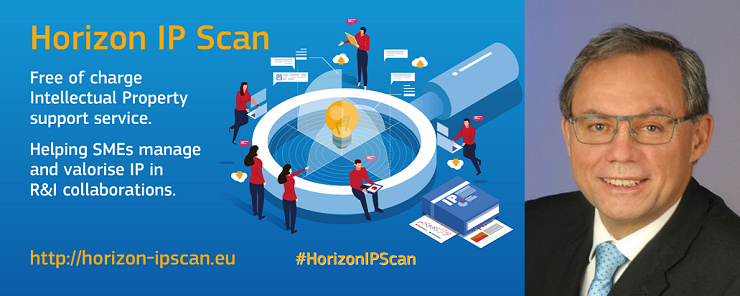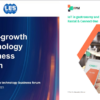SME in Horizon EU projects – IP Support by HORIZON IP SCAN
In my capacity as a co-chair of the I3PM Committee IP for SMEs, together with expert colleagues Ivan Gauci, Erica K. Smith, Russel Thom and Claire Fritz, we are striving for supporting SMEs in all aspects of IP and IPR. This contribution is therefore covering an important aspect, namely intellectual property rights in European co-operation projects.
The successful implementation of innosupp projects such as the Horizon IP Scan discussed here, or the European IP Helpdesk and the associated EEN Ambassador Programme is in the hands of the IP & Innovation Unit of Eurice GmbH under the leadership of Claire Fritz. Myself, I am a long-time expert at all 3 above mentioned initiatives.
The EU project HORIZON IP SCAN, as part of the 2020 IP Action Plan, has just ended, running from Nov. 25th, 2021, to Nov. 24th, 2023, with EURICE as the project coordinator. It has been tailored to the needs of SMEs and startups involved in early stages of EU-funded collaborative R&I projects.
The subtitle of the EU project HORIZON IP SCAN summarizes some goals very well with “Helping SMEs manage and valorise Intellectual Property (IP) in R&I collaborations.” This clearly hints to the importance of proper IP management by SMEs being a decisive part of a successful consortium with an approved EU project, e.g., a Horizon Europe project.
A main goal has been to support SMEs free-of-charge in understanding and properly using the IP clauses in Consortium Agreements (CA). In some cases, CAs had already been signed before the service, while for other SMEs this was an appreciated service, either in properly defining the own background, joint ownership or discussing clauses with respect to the intended exploitation.
A focus of SME IP counselling was how to protect their existing IP when starting a joint research and innovation endeavour with multiple partners from different countries.
Furthermore, SMEs shall be assisted in developing a shared strategy with their project partners to manage and exploit new IP jointly generated in their project. With universities as project partners, a sound procedure how to first check patentability or unacceptable leaks of trade secrets, while allowing publications after enough time for checking is very important.
The principal goals are also well depicted in the YouTube video:
In total, more than 100 experts from 27 countries able to provide the service in 23 languages were engaged for Horizon IP Scan services. Overall, 403 applications were received, yet only 352 of them were eligible for the service. With a start of the services in 2022, still 34% of the supported SMEs were engaged in Horizon 2020 not longer than 6 months, as this was a prerequisite to be eligible. Horizon Europe projects were addressed in 45% of the cases, 18% were EUREKA Eurostars 3 projects and 3% referred by EEN.
My involvement as local expert is due to long-time experience as an IP expert at Business Upper Austria with a focus on SMEs since 2006, especially with IP services for Enterprise Europe Network clients, and also based on experiences from 19 years in R&D departments of two renown Austrian industrial companies, resulting in inventorship in 14 patent families. The 10 years as Ambassador of the European IP Helpdesk have further strengthened my capacity as IP expert for this HORIZON IP SCAN and other SME-oriented EU projects, with the biggest one VIP4SME from 12/2015 – 12/2019, in which I was responsible for IP Toolbox.
The HORIZON IP SCAN project started in 2021 and was conducted in 27 European countries, with a choice of local experts often done by national intellectual property offices, as e. g. in Germany and in Austria. I have been chosen as local IP expert by the Austrian Patent Office early in 2021, together with 3 other Austrian local IP experts.
After preparatory efforts by the project coordinator EURICE, the chosen local experts were trained online in 7 training modules in April and May 2021, regarding project aims, procedures and files to be used for providing the service and for reporting.
Following general challenges in the service provision had to be addressed:
As it was a new, unknown service, a general information to all eligible SMEs from a central agency is not convincing for all, even as a free-of-charge service.
An early information regarding new Grant Agreements to IP service providers like our Business Upper Austria is not foreseen. With some effort and knowledge, the info can be found on Cordis, but this is not part of the usual procedures.
The timing of the service is not always according to needs. For quite some projects, it is too late for early signed CA, on the other hand too early for Key Exploitable Results (KERs).
The mutual expectations on IP advice were not always matching. Whereas the intention of the service was to support IP strategies and exploitation, often a support in tackling current IP issues was requested by SMEs.
A further challenge was that the advice requested by SMEs was often focussed on corporate interests, and not on the principal goals of collaborative projects regarding joint IP management strategies to improve joint development resulting in joint ownership.
My first client receiving the HORIZON IP SCAN service was assigned in September 2021.
In total I served 5 SMEs from completely different branches and with different consortium settings requiring tailor-made IP counselling.
I was honoured to be chosen as one of two experts reporting on their experiences with Horizon IP Scan services at the final meeting concluding the project on Nov. 10th, 2023. These reported and further experiences shall be addressed in the following parts.
Following IP demands from pre-interviews required thorough preparations for the main interview, with recommendations for addressing the demands given after respective explanations.
In cases with pending Consortium Agreement, clauses of DESCA Model Consortium Agreement were discussed and possible adaptations recommended.
In one Horizon 2020 project African countries are the target countries for making use of the project results, among them targeted patents. The question was how to nationalize patents in Africa. The preparation resulted in recommendations, which African countries can be reached via a PCT application, and which others require the OAPI route.
In another project the SME was advised how to cope with possible issues regarding a competitor bought by the project coordinator shortly before project start.
A frequent issue was the proper definition of background. In most cases it is recommended to use a positive list, as there are no doubts left what exactly the background is.
In another project, a partner did not disclose background. This was not plausible, as they have a lot of background in the very technical field. A recommendation was to check their patents, publications and website and to ask for missing disclosure of background, if need for exploitation in the project.
If joint ownership is to be avoided, a mutual intention to focus on own strengths for separate results and IPR, while still developing an innovative system together, avoids problems. Such an approach of the involved SME can reduce chances for joint inventions, yet is realistic in cases where the technical strengths are complementing each other without significant overlap, but still cooperation is necessary to develop an innovative prototype incorporating both developments in a matching way.
Overall, a wide scope of IP topics had to be addressed for the varying needs of the SMEs in different project constellations, ranging from advising proper IP clauses in Consortia Agreements, sometimes patent search regarding IPR of project partners to proper patent internationalisation in different African countries, partly via PCT, partly only possible via OAPI.
The satisfaction reports showed an optimal satisfaction of the SME needs in my services, and therefore my overall impression was that this service really helped to improve IP management for the SMEs and thereby also increased the success rate of EU funded projects, especially regarding exploitation.
About the blogpost author:
 Udo has 20 years of industrial R&D experience and 17 years as IP expert at Business Upper Austria, serving Upper Austrian companies. Udo holds a PhD in Physical Chemistry and is fluent in German (MT) and English.
Udo has 20 years of industrial R&D experience and 17 years as IP expert at Business Upper Austria, serving Upper Austrian companies. Udo holds a PhD in Physical Chemistry and is fluent in German (MT) and English.
Udo offers IP services since 2006 – Advice on property rights, is nationally and internationally as European IP Helpdesk Ambassador well connected, provides free IP services for EEN clients in European and international innovation networks and leads the Business Upper Austria PATLIB centre. Furthermore, Udo is engaged as co-chair in the I3PM Committee IP for SMEs
Udo supports IP commercialization with patent valuation, successful patenting with novelty searches and IP counselling and provides universities with the assessment of employee inventions and recommendations for take-up.



